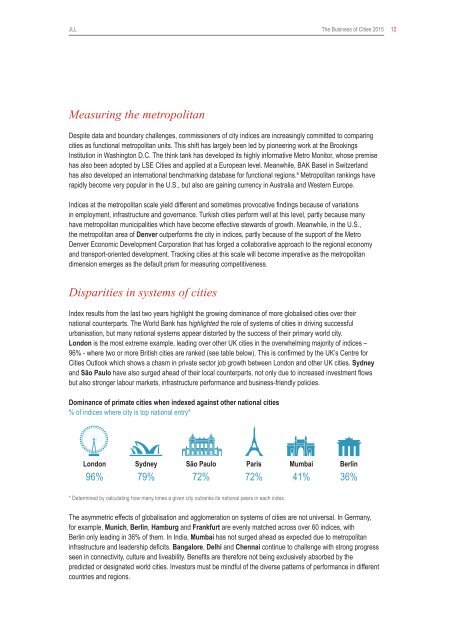The Business of Cities 2015
jll-business-of-cities-report
jll-business-of-cities-report
Create successful ePaper yourself
Turn your PDF publications into a flip-book with our unique Google optimized e-Paper software.
JLL<br />
<strong>The</strong> <strong>Business</strong> <strong>of</strong> <strong>Cities</strong> <strong>2015</strong> 12<br />
Measuring the metropolitan<br />
Despite data and boundary challenges, commissioners <strong>of</strong> city indices are increasingly committed to comparing<br />
cities as functional metropolitan units. This shift has largely been led by pioneering work at the Brookings<br />
Institution in Washington D.C. <strong>The</strong> think tank has developed its highly informative Metro Monitor, whose premise<br />
has also been adopted by LSE <strong>Cities</strong> and applied at a European level. Meanwhile, BAK Basel in Switzerland<br />
has also developed an international benchmarking database for functional regions. 6 Metropolitan rankings have<br />
rapidly become very popular in the U.S., but also are gaining currency in Australia and Western Europe.<br />
Indices at the metropolitan scale yield different and sometimes provocative findings because <strong>of</strong> variations<br />
in employment, infrastructure and governance. Turkish cities perform well at this level, partly because many<br />
have metropolitan municipalities which have become effective stewards <strong>of</strong> growth. Meanwhile, in the U.S.,<br />
the metropolitan area <strong>of</strong> Denver outperforms the city in indices, partly because <strong>of</strong> the support <strong>of</strong> the Metro<br />
Denver Economic Development Corporation that has forged a collaborative approach to the regional economy<br />
and transport-oriented development. Tracking cities at this scale will become imperative as the metropolitan<br />
dimension emerges as the default prism for measuring competitiveness.<br />
Disparities in systems <strong>of</strong> cities<br />
Index results from the last two years highlight the growing dominance <strong>of</strong> more globalised cities over their<br />
national counterparts. <strong>The</strong> World Bank has highlighted the role <strong>of</strong> systems <strong>of</strong> cities in driving successful<br />
urbanisation, but many national systems appear distorted by the success <strong>of</strong> their primary world city.<br />
London is the most extreme example, leading over other UK cities in the overwhelming majority <strong>of</strong> indices –<br />
96% - where two or more British cities are ranked (see table below). This is confirmed by the UK’s Centre for<br />
<strong>Cities</strong> Outlook which shows a chasm in private sector job growth between London and other UK cities. Sydney<br />
and São Paulo have also surged ahead <strong>of</strong> their local counterparts, not only due to increased investment flows<br />
but also stronger labour markets, infrastructure performance and business-friendly policies.<br />
Dominance <strong>of</strong> primate cities when indexed against other national cities<br />
% <strong>of</strong> indices where city is top national entry*<br />
London Sydney São Paulo Paris Mumbai Berlin<br />
96% 79% 72% 72% 41% 36%<br />
* Determined by calculating how many times a given city outranks its national peers in each index.<br />
<strong>The</strong> asymmetric effects <strong>of</strong> globalisation and agglomeration on systems <strong>of</strong> cities are not universal. In Germany,<br />
for example, Munich, Berlin, Hamburg and Frankfurt are evenly matched across over 60 indices, with<br />
Berlin only leading in 36% <strong>of</strong> them. In India, Mumbai has not surged ahead as expected due to metropolitan<br />
infrastructure and leadership deficits. Bangalore, Delhi and Chennai continue to challenge with strong progress<br />
seen in connectivity, culture and liveability. Benefits are therefore not being exclusively absorbed by the<br />
predicted or designated world cities. Investors must be mindful <strong>of</strong> the diverse patterns <strong>of</strong> performance in different<br />
countries and regions.








